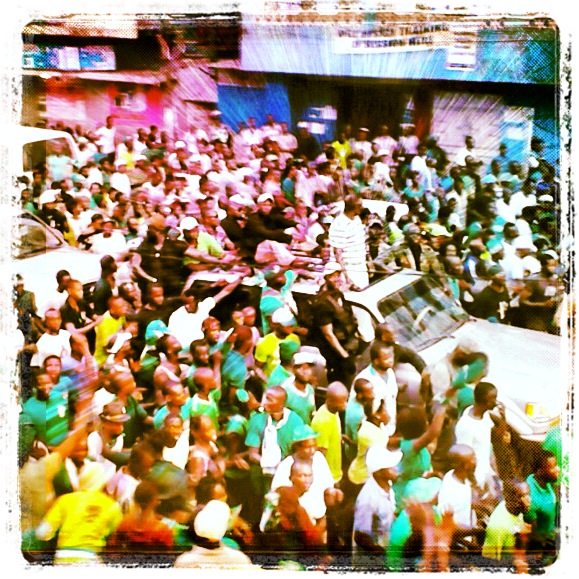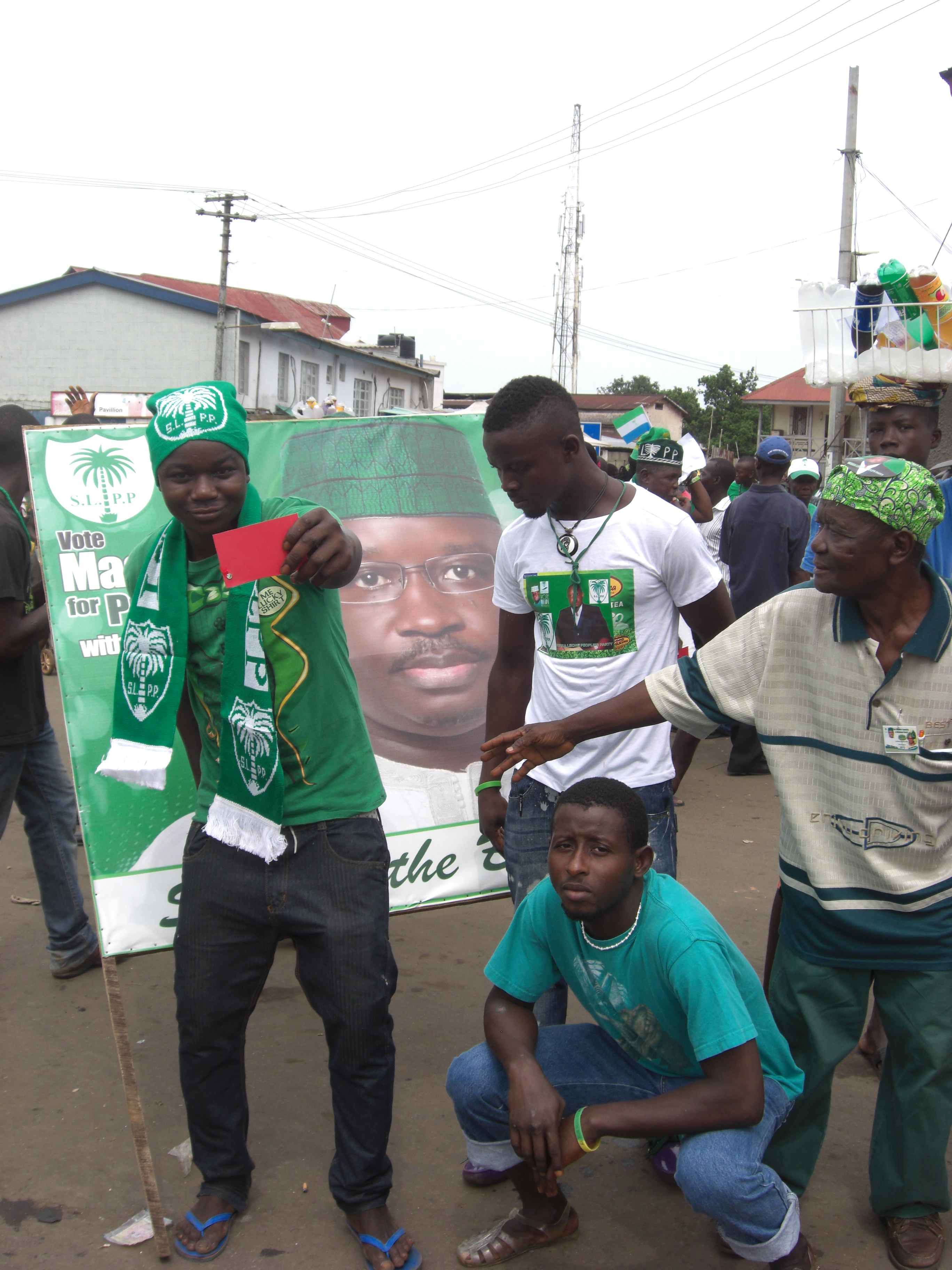According to a number of local and international NGO’s, journalists and researchers monitoring the situation on the ground, the large scale investment in Sierra Leone between Addax Onyx Group (AOG) and Swedfund, as well as a range of additional investors, is causing concern. The main concern is that the investment is contributing to poverty, decreased access to basic rights and may increase instability and anger amongst the local population. Swedfund is consistently dismissing the concerns, arguing that the monitoring of the situation is not sufficient and not carried out in detail, hence not trustworthy and does not illustrate the overall situation. Swedfund on their side emphasize that the project is in its start-up phase and therefore it is therefore too early to measure impact. However, those monitoring the situation are many and conclusions based on their monitoring are coherent and consistent and can therefore not be dismissed.
TagSierra Leone
Multi-party elections were a prominent feature of Africa’s political landscape in 2012, with twenty-three countries conducting polls – whether presidential, legislative or municipal. News coverage in the mainstream media has, at times, been framed in clichés and stereotypes. On the eve of the Sierra Leonean elections, the BBC published an article which opened: “Sierra Leone may be about to prove it has grown up”. The preoccupation is often with little more than who is likely to win and whether there will be violence. Rapid and diverse political transitions taking place across the continent are seldom reflected upon in any depth.
I have a longstanding interest in the politics of Sierra Leone, and so followed the elections on 17th November 2012 closely – albeit from a distance. I found a number of striking similarities with the polls in Ghana, which took place a few weeks later on 7-8th December, particularly interesting.
Late in the afternoon of Friday 24 November, as the sun was setting over the busy streets of downtown Freetown, the National Election Commission (NEC) of Sierra Leone called a press conference to announce the results of the Presidential Elections, ending a week of uncertainty and speculations. As anticipated by many, the sitting President Ernest Bai Koroma of the All People’s Congress (APC) secured a second term in power with almost 59 percent of the votes cast, thereby avoiding a run-off against the main opposition leader, the former military junta leader Julius Maada Bio of the Sierra Leone People’s Party (SLPP), who received 37, 4 percent. None of the other candidates were able to secure more than 1,5 precent, confirming the growing polarisation of the political landscape in post-war Sierra Leone. The turnout was high, with a national average of 87 percent. Continue reading
Late in the afternoon of Friday 24 November, as the sun was setting over the busy streets of downtown Freetown, the National Election Commission (NEC) of Sierra Leone called a press conference to announce the results of the Presidential Elections, ending a week of uncertainty and speculations. As anticipated by many, the sitting President Ernest Bai Koroma of the All People’s Congress (APC) secured a second term in power with almost 59 percent of the votes cast, thereby avoiding a run-off against the main opposition leader, the former military junta leader Julius Maada Bio of the Sierra Leone People’s Party (SLPP), who received 37, 4 percent. None of the other candidates were able to secure more than 1,5 precent, confirming the growing polarisation of the political landscape in post-war Sierra Leone. The turnout was high, with a national average of 87 percent. Continue reading
Now, a few days after the election on November 17, everyone is waiting for the National Electoral Commission (NEC) to announce the final results. Rumors of when NEC is going to announce the results spread like wildfire across Freetown, where people are eagerly anticipating the results. Whether via radio, tv or text messages each press conference by NEC is believed to be the big one, where the results will be called by NEC’s chairperson Christiana Thorpe. But so far everyone is still waiting.
Continue reading“We want a transparent election with no violence” was a statement shared by people in the streets of Freetown when they went to vote for the presidential and parliamentary elections yesterday (November 17). With no cars allowed in the street and with the threat of being arrested if gathering in groups or if engaging in any form of political campaigning, Freetown street life was marked by an unusual quietness. Before daybreak people were queuing waiting for the polling stations to open and voter turnout was reported high all over the country. With the exception of a few incidents, the election has been reported generally peaceful so far. Continue reading
Charles Taylor will spend the rest of his life in prison (unless someone decides to assist his escape again :)) for aiding and abetting war crimes in Sierra Leone. As a comparison Issa Sesay, one of the senior commanders of RUF, was sentenced by the same court to 52 years. Most commentators have raised words of optimism saying that the trial will send signals to other warlords that they will eventually be dealt with if they don’t “behave”. Maybe so, but I doubt. Anyone who decides to lead armed incursions or make military coups is quite aware of the stakes and prepared to take the risks. After all it is a prerequisite that they gamble rather offensive with their own life by leading such endeavors. However what may be the outcome is that a set of future military leaders (and some currently in power) must think twice with whom they form alliances and be aware that it should rather not be someone who is on bad footing with the mighty West.
Two short observations to be made: firstly, I guess we will see some shifts in political alliances on the Liberian arena. They may not happen overnight, and they may not be directly visible to all observers – after all Liberian politics by and large happens behind the scenes. And secondly, I hope that Charles Taylor will spend some of his time in jail writing, or narrating to others, his proper version of the Liberian civil war. What else should he do with all his time?
Gerhard Anders has also written some closing remarks on the Taylor saga:
by Gerhard Anders, Centre of African Studies, University of Edinburgh
Representatives of international organizations, humanitarian NGOs and Western governments have hailed the guilty verdict against Charles Taylor as an important milestone in the global fight against impunity. With this judgement the Special Court for Sierra Leone, established in 2002 at the request of the government of Sierra Leone, concludes the international effort to hold accountable those ‘bearing greatest responsibility’ for war crimes committed between November 1996 and 2002 in Sierra Leone. In the streets of Freetown, most people greeted the news of the judgement with an indifferent shrug whilst critical voices where heard in parts of neighbouring Liberia. In contrast to the self-congratulatory praise by humanitarian activists and Western governments, people in Sierra Leone and Liberia hold much more differentiated views on the trial against Charles Taylor. To a large degree these are shaped by the current political and economic situation in both countries. Continue reading
Last week I participated in the third Marrakech Security Forum which this year focused on “Issues and security consequences of transition in North Africa”. It also included several panels on the consequences for the Sahel region, as well as the problem of drugs trafficking in West Africa. In this well-ordered event organized by Federation Africaine Des etudes Strategiques/Centre Marocain des Etudes Strategiques there were participants from some 50 countries, about 120 men but only 10 women, clearly indicating the male biased interest in the security business. Participants came chiefly from the MENA region but to quite some extent also from francophone Africa south of the Sahara. It was a crowd of senior diplomats, high rank militaries and professors. It appeared that everyone was a director of one institute or another other. There were naturally also a number of Europeans and Americans. Many of the more than hundred, too brief, presentations were quite general statements on the political situation in North Africa and in the Sahel region. Interestingly U.S. officials and academics choose to humbly downplay the U.S. role in Africa in the years to come, except for in a few strategic countries. French officials raised concern over the situation in Algeria and also talked about the situation in the Sahel as “war” and showed concern for the increasing interconnectedness of militant Islamist groups in the region and all the way down to Nigeria. Participants from Africa South of the Sahara gave quite divergent views on the possibilities of an “African spring”, but the Sahelialists were equally afraid of developments around AQIM, Boko Haram and other radical groups. Continue reading
Last week I participated in the third Marrakech Security Forum which this year focused on “Issues and security consequences of transition in North Africa”. It also included several panels on the consequences for the Sahel region, as well as the problem of drugs trafficking in West Africa. In this well-ordered event organized by Federation Africaine Des etudes Strategiques/Centre Marocain des Etudes Strategiques there were participants from some 50 countries, about 120 men but only 10 women, clearly indicating the male biased interest in the security business. Participants came chiefly from the MENA region but to quite some extent also from francophone Africa south of the Sahara. It was a crowd of senior diplomats, high rank militaries and professors. It appeared that everyone was a director of one institute or another other. There were naturally also a number of Europeans and Americans. Many of the more than hundred, too brief, presentations were quite general statements on the political situation in North Africa and in the Sahel region. Interestingly U.S. officials and academics choose to humbly downplay the U.S. role in Africa in the years to come, except for in a few strategic countries. French officials raised concern over the situation in Algeria and also talked about the situation in the Sahel as “war” and showed concern for the increasing interconnectedness of militant Islamist groups in the region and all the way down to Nigeria. Participants from Africa South of the Sahara gave quite divergent views on the possibilities of an “African spring”, but the Sahelialists were equally afraid of developments around AQIM, Boko Haram and other radical groups. Continue reading
© 2024 Mats Utas
Theme by Anders Norén — Up ↑

